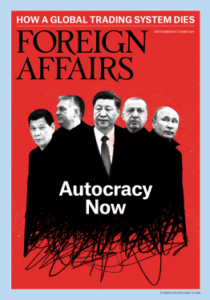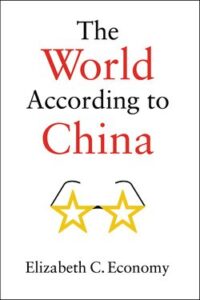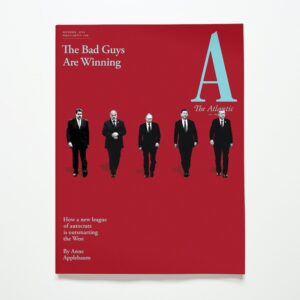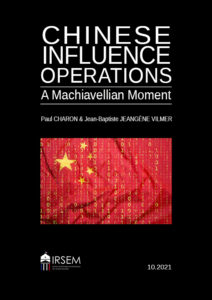 In the heyday of communism, Russia and China supported revolutionary forces around the world. But today Moscow and Beijing have embraced the rhetoric of counter-revolution, writes FT analyst Gideon Rachman:
In the heyday of communism, Russia and China supported revolutionary forces around the world. But today Moscow and Beijing have embraced the rhetoric of counter-revolution, writes FT analyst Gideon Rachman:
The ambitions of Russia and China, however, are far from being wholly defensive. Both Putin and Xi believe that their vulnerability to “colour revolutions” stems from fundamental flaws in the current world order — the combination of institutions, ideas and power structures that determines how global politics plays out. ….Beijing and Moscow argue that the current world order is characterised by an American attempt to impose western ideas about democracy and human rights on other countries, if necessary through military intervention. The new world order that Russia and China are demanding would instead be based on distinct spheres of influence.
After meeting Australian counterparts, Britain’s Foreign Secretary Elizabeth Truss delivered an address to the Lowy Institute last Friday which outlined how the United Kingdom will work with partners to build a global “Network of Liberty” to stand up for freedom and push back against increasing threats to international security, Mercedes Page writes for The Interpreter.
Truss first outlined the Network of Liberty concept in a major foreign policy speech to Chatham House, off the back of the UK’s Integrated Review in 2021. Yet curiously this vision makes no mention of the “D10” – a newish label to group 10 of the worlds’ leading democracies – and what had been billed as one of the UK’s key foreign policy priorities of 2021, she adds.
 Elizabeth Economy’s new book, “The World According to China,” is important because it illuminates the ways in which Xi’s China aims to shape a “radically transformed” international order — by force and by other means, analyst Trudy Rubin observes.
Elizabeth Economy’s new book, “The World According to China,” is important because it illuminates the ways in which Xi’s China aims to shape a “radically transformed” international order — by force and by other means, analyst Trudy Rubin observes.
If Xi’s dreams come true, Economy contends, “the system of U.S. alliances that have underpinned the international system for more than 70 years” would be dissolved “in favor of a proposed Chinese framework that favored state controls and repression over individual freedoms, including rules for the global internet, cyber and safety in space.”
Authoritarian states such as Russia and China want to write their own fictive accounts of the past in order to sustain their prejudices and power structures, adds Chris Patten. But open, democratic societies that value freedom need to be brave and honest about their own histories, he writes for Project Syndicate.
Battle of ideas
 For Russia and China, the making of a new world order is not simply a matter of raw power. It is also a battle of ideas. While the western liberal tradition promotes the idea of universal human rights, Russian and Chinese thinkers make the argument that different cultural traditions and “civilisations” should be allowed to develop in different ways, adds Rachman:
For Russia and China, the making of a new world order is not simply a matter of raw power. It is also a battle of ideas. While the western liberal tradition promotes the idea of universal human rights, Russian and Chinese thinkers make the argument that different cultural traditions and “civilisations” should be allowed to develop in different ways, adds Rachman:
- Fyodor Lukyanov, a Russian foreign-policy thinker close to President Putin, believes that unipolarity “gave the United States the ability and possibility to do whatever it saw fit on the world stage”.
- Yan Xuetong, dean of the school of international relations at Tsinghua University in Beijing (Xi’s alma mater), writes that “China believes that its rise to great-power status entitles it to a new role in world affairs — one that cannot be reconciled with unquestioned US dominance.” Like Lukyanov, Yan believes that “the US-led world order is fading away . . . In its place will come a multipolar order”. President Xi himself has put it even more succinctly with his often repeated claim that “the east is rising and the west is declining”.
- Vladislav Surkov, once an influential adviser to Putin, has decried Russia’s “repeated fruitless efforts to become a part of western civilisation”. Instead, Russia should embrace the idea that it has “absorbed both east and west” and has a “hybrid mentality”. In a similar vein, pro-government thinkers in Beijing argue that a fusion of Confucianism and communism means that China will always be a country that stresses collective rather than individual rights.
- Dmitri Trenin of the Carnegie Center in Moscow argues that, “For the country’s leaders, Russia is nothing if it is not a great power.” Having seen Nato expand into much of what was once the Soviet bloc, he adds, Putin sees Ukraine as his “last stand”.
 Are we witnessing a “Russification” of China’s influence operations? What are the causes and dynamics of this shift, and how effective is this new Chinese posture? The Swedish National China Centre at the Swedish Institute of International Affairs (UI) hosts the digital launch of a new report, “Chinese Influence Operations: A Machiavellian Moment.”
Are we witnessing a “Russification” of China’s influence operations? What are the causes and dynamics of this shift, and how effective is this new Chinese posture? The Swedish National China Centre at the Swedish Institute of International Affairs (UI) hosts the digital launch of a new report, “Chinese Influence Operations: A Machiavellian Moment.”
Speakers: Dr Paul Charon, Director for Intelligence, Strategic Foresight, and Hybrid Threats at the Institute for Strategic Research (IRSEM) of the French Ministry for Armed Forces; Dr Jean-Baptiste Jeangène Vilmer, Director of IRSEM and nonresident Senior Fellow at the Atlantic Council. Monday 31 January 2022 Time 09:00 – 10:00. RSVP







